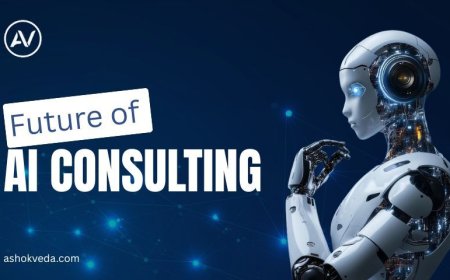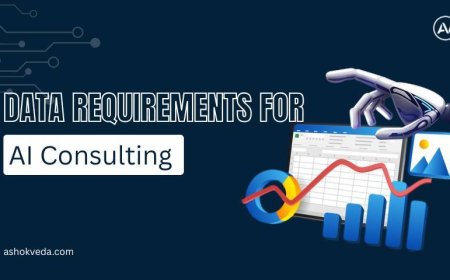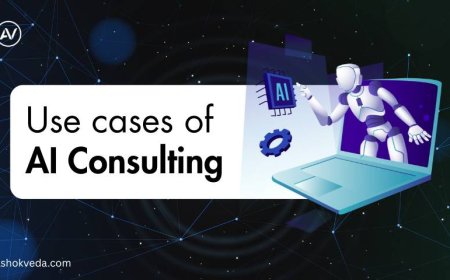Transformative Case Studies of AI Consulting You Need to Know
Explore real-world case studies of AI consulting and discover how AI is transforming industries, enhancing efficiency, and driving innovation across businesses in 2025.
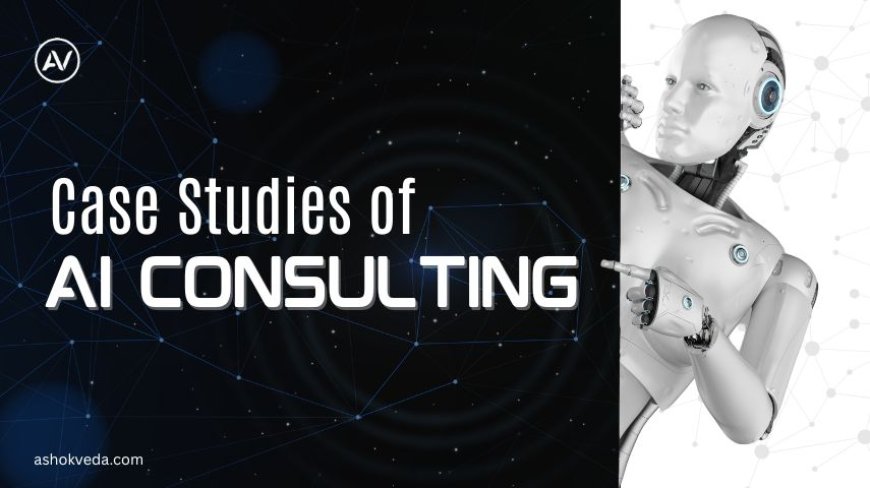
Artificial intelligence (AI) has evolved from a futuristic concept to a cornerstone of business strategy across industries. The global AI consulting market, valued at approximately $11.07 billion in 2025, is projected to reach an impressive $90.99 billion by 2035, reflecting a robust compound annual growth rate (CAGR) of 26.2%. This surge underscores the increasing reliance of organizations on AI to enhance operational efficiency, innovate processes, and maintain a competitive advantage.
As a digital transformation consultant, I've witnessed firsthand the profound impact of AI on business strategies. The integration of AI solutions has not only streamlined operations but also unlocked new avenues for growth and innovation. However, this rapid evolution also presents challenges, including navigating the complexities of AI implementation and ensuring ethical considerations are met.
Case studies of AI consulting
1. McKinsey & Company's AI-Driven Transformation
McKinsey & Company, a global consulting leader, has integrated AI into its operations to enhance efficiency and client service. The firm launched its generative AI platform, Lilli, in July 2023, which has since become central to its knowledge operations. Over 72% of McKinsey's 45,000 professionals now use Lilli, issuing over 500,000 prompts monthly, reclaiming approximately 30% of research time.
This AI integration has allowed McKinsey to reduce research time, enabling consultants to focus more on client interactions and strategic analysis. Additionally, the firm has shifted 25% of its engagements to outcome-based models, reflecting a deeper involvement in client implementations. AI-related consulting now accounts for 40% of McKinsey's revenue, demonstrating the transformative impact of AI on its business model.
2. Deloitte's AI for Infrastructure Resilience
Deloitte's report, "AI for Infrastructure Resilience," highlights the critical role of AI in mitigating infrastructure damage from climate-related disasters, which could reach up to A$705 billion annually by 2050. The report emphasizes that timely AI implementation could prevent up to 15% of such losses.
Deloitte's AI applications span all lifecycle stages—from design to recovery. Notable uses include AI-powered digital twins for climate simulations, early warning systems for hazard detection, and AI-driven post-disaster recovery tools. These AI solutions enable more resilient infrastructure planning and management, helping communities better prepare for and recover from natural disasters.
3. EY's AI Integration in Accounting
Ernst & Young (EY) has invested $1 billion in AI and workforce development to make accounting less tedious and more appealing. Rather than replacing human accountants, EY is integrating AI agents into tax, risk, and finance functions through its EY.ai Agentic Platform, developed with Nvidia.
This initiative aims to automate time-consuming tasks like data collection and compliance, allowing human professionals to focus on more engaging and critical work. EY plans to expand its workforce to 500,000, including 200,000 AI agents, while continuing to hire and train new accountants. AI-enhanced audits now process thousands of transactions more quickly and accurately, making the work less daunting and more satisfying.
4. DrHR: AI-Powered HRMS Platform
DrHR is a next-generation AI-powered Human Resource Management System (HRMS) platform designed to transform traditional HR processes into intelligent, data-driven workflows. Built for businesses of all sizes, DrHR centralizes and simplifies complex HR functions, including recruitment, onboarding, performance reviews, and compliance within a user-friendly system.
Its AI-driven automation and analytics empower HR teams to boost productivity and focus on strategic growth, putting it among the top case studies of AI consulting in 2025. By automating routine tasks, DrHR allows HR professionals to dedicate more time to employee development and organizational strategy.
5. Ashok Veda’s Leadership in AI Consulting at Rubixe
Ashok Veda, a seasoned AI advocate and entrepreneur, is the founder and CEO of Rubixe, an AI solutions company based in Bengaluru. With over two decades of experience in AI, IoT, and ML, Veda has been instrumental in driving Rubixe's mission to revolutionize businesses through disruptive technologies.
In 2017, Rubixe recognized the growing demand for AI-driven solutions across various sectors. Businesses were seeking ways to enhance efficiency, predict consumer behavior, and automate processes. However, many organizations lacked the expertise to implement AI effectively. Rubixe aimed to bridge this gap by providing tailored AI consulting services.
Under Veda's leadership, Rubixe developed several AI-powered products and services:
-
Rubixe Chatbot: A customizable AI chatbot platform designed to enhance customer service across industries.
-
AI4Commerce: An AI software integrated into e-commerce sites to predict product purchases, enhancing sales by up to 20%.
-
AI & ML Solutions: Tailored solutions for sectors like finance, healthcare, retail, and logistics, focusing on predictive analytics and automation.
Rubixe's AI consulting services have led to significant improvements for clients:
-
Increased Efficiency: Automation of routine tasks, allowing businesses to focus on strategic initiatives.
-
Enhanced Sales: E-commerce clients experienced up to a 20% increase in sales through AI-driven product recommendations.
-
Global Reach: Collaborations with major companies like Dell, Cisco, and PayPal, showcasing Rubixe's capability to deliver scalable AI solutions.
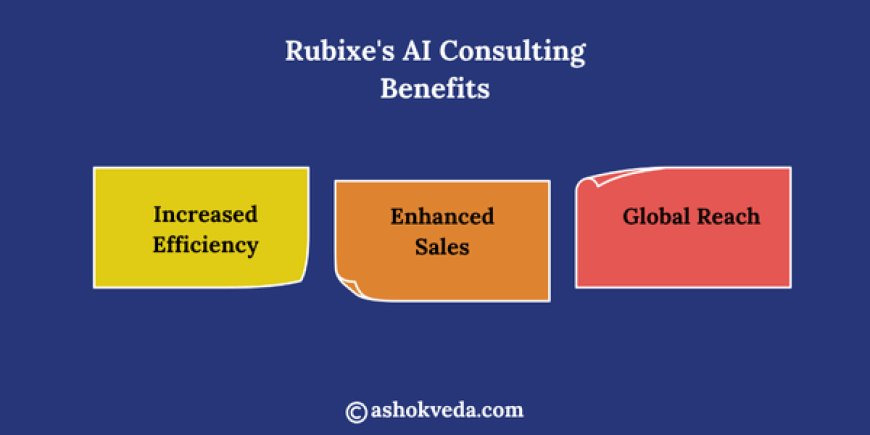
Ashok Veda's leadership at Rubixe exemplifies the transformative power of AI consulting. By understanding industry-specific challenges and developing tailored AI solutions, Rubixe has empowered businesses to innovate and stay competitive in a rapidly evolving market
6. Darktrace's Antigena Agent in Cybersecurity
Darktrace's Antigena is an autonomous AI agent that detects and responds to cybersecurity threats in real-time. In a case study, Antigena was integrated into an enterprise's IT infrastructure to automatically identify anomalies and respond to potential threats without human intervention.
The implementation of Antigena resulted in a 92% reduction in potential breaches and a significant decrease in the time required to respond to security incidents. This case demonstrates the effectiveness of agentic AI in enhancing cybersecurity measures and protecting organizations from evolving threats.
7. BenevolentAI and AstraZeneca's Drug Discovery Collaboration
BenevolentAI and AstraZeneca collaborated to deploy an AI agent that rapidly identified potential treatments for chronic kidney disease. The AI agent analyzed biological datasets and simulated molecular interactions to identify viable drug targets.
This collaboration reduced the time required for drug discovery by 70% and enabled the fast-tracking of drugs for clinical development. The use of AI in this context highlights its potential to accelerate pharmaceutical research and development processes, leading to quicker delivery of treatments to patients.
8. Walmart's Autonomous Inventory Bot
Walmart deployed an AI-powered autonomous inventory bot to monitor shelf inventory and trigger restocking decisions. The bot utilized computer vision and machine learning algorithms to identify stock levels and predict demand.
The implementation of this AI solution led to a 35% reduction in excess inventory and a 15% improvement in inventory accuracy. By automating inventory management, Walmart was able to reduce carrying costs, improve product availability, and enhance customer satisfaction.
The case studies presented illustrate the profound impact of AI consulting across various industries, from healthcare and finance to logistics and public services. AI is not merely a tool for automation but a catalyst for innovation, enabling organizations to enhance efficiency, reduce costs, and deliver superior services. As AI continues to evolve, its applications will expand, offering new opportunities for businesses to leverage intelligent solutions. Consulting firms play a pivotal role in guiding organizations through the complexities of AI adoption, ensuring successful implementation and maximizing value.

























